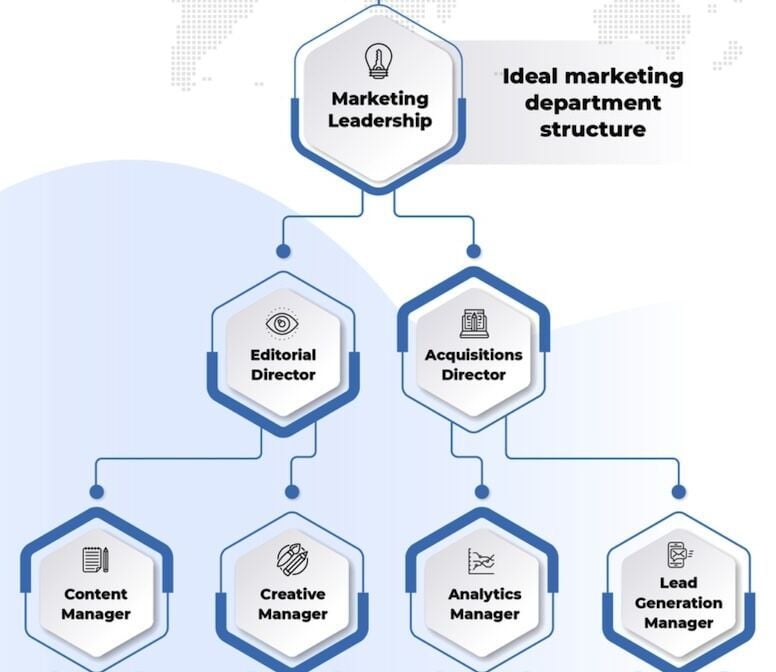The Perfect Digital Marketing Team Structure (2025)

- Ensure your marketing team has clear leadership with defined roles like CMO or a fractional CMO to guide strategy and align goals.
- Consider a mix of in-house and outsourced resources to balance expertise, scalability, and cost-effectiveness in building your marketing team.
- Focus on establishing strong communication, clear roles, respect, and empathy within your marketing team to optimize effectiveness.
- Leverage fractional marketing teams to fill skill gaps and provide flexible scaling options for your business needs.
- Outsourcing roles like paid advertising specialist and SEO strategist can provide access to industry expertise and enhance your marketing efforts.
Today's digital landscape is competitive, and consumer behaviors change constantly. So, companies must look for creative ways to boost visibility, credibility, and profit to stay in business.
The problem: most businesses don't have well-structured marketing teams to ideate and execute properly, which also leads to difficulties in scalability.
Effective marketing teams must be flexible and scalable. They should adapt quickly to changing market conditions and customer behaviors. This adaptability is linked to higher productivity and innovation within the team. [source]
What happens if you don't have a well-structured marketing department?
- You risk losing leads, customers, and ultimately revenue without the proper marketing team structure.
- You'll also lose ground to competitors with well-structured teams.
The ideal digital marketing team structure varies based on the organization's specific goals, needs, and of course, size. Having collaborated with dozens of marketing teams, we have seen what works, so we'll let you in on the secrets.
Note: If building or scaling your team feels daunting, there’s another option. You can access a team of seasoned marketing professionals without the challenges of hiring, onboarding, and training at 2x - 5x less cost than hiring FTEs with our fractional marketing team services. It's a faster, more flexible way to get the expertise and scalability your business needs to thrive.
What Kind of People Make up a Great Marketing Team?
Key Marketing Team Roles
Marketing leadership can make or break a marketing team, and can positively or negatively impact the company's entire revenue generation efforts. Naturally, this is the most important thing to get right.
Marketing Leadership (CMO, CRO, and other titles)

Marketing leadership oversees the entire operation and ensures the smooth and successful execution of the marketing strategy. This can be a CMO, VP of Marketing, Director of Marketing, Digital Marketing Director, or a combination of these roles, sometimes substituting "growth," "demand," or other trendy terms for "marketing" in their title.
Without a CMO, the marketing team lacks direction and strategy. This makes it hard to get everyone on the same page and allocate budgets effectively for your digital marketing strategy. Certain organizations will even hire a part-time fractional CMO.
Some organizations have a Chief Revenue Officer instead of or in addition to a CMO for several reasons, mainly related to the holistic approach to revenue generation and alignment of sales and marketing functions.
In today's tech-heavy digital marketing environment, the role of Marketing Operations has emerged as an important leadership role.
What follows are several roles that exist in the perfect marketing team structure. All of them do not always directly report to marketing leadership — sometimes some report to intermediaries like the Editorial Director and Acquisitions Director.
Digital Marketing Manager
A Digital Marketing Manager plays a pivotal role in driving brand awareness, generating leads, and increasing sales through digital channels. This role requires a deep understanding of various digital marketing tactics, including search engine optimization (SEO), pay-per-click (PPC) advertising, social media marketing, email marketing, and content marketing.
The Digital Marketing Manager is responsible for the development and execution of the digital marketing campaign. This involves conducting thorough market research, identifying target audiences, setting clear objectives, and crafting strategic plans. They collaborate closely with other digital marketing departments, such as creative and content teams, to ensure consistent branding and messaging across all digital channels.
This marketing leader possesses strong analytical skills to measure the effectiveness of digital marketing efforts. They use various tools and platforms to track key performance indicators (KPIs), such as website traffic, conversion rates, and return on investment (ROI). By analyzing these metrics, they can identify areas for improvement and optimize campaigns accordingly.
Editorial Director
Within 0.05 seconds, website visitors form their first impression of your brand. The editorial director ensures that the first interaction with all your content is positive. They supervise text like ad copy, graphical content like infographics, and audiovisual content generation and oversee all efforts to attract and retain interest. This way, your company is better suited to convert visitors into leads and eventual customers.
Reports to: CMO or VP/Director of Marketing.
Content Manager
Content Managers direct the content marketing strategy and all content generated for and by the company. They ensure every piece of content is up to the desired levels of quality and adheres to brand guidelines. They also help develop content to attract and retain traffic through all the target channels.
Without a content manager, team members not used to building inbound demand must coordinate content creation and distribution themselves. This is time-consuming and leads to inconsistencies in content or missed opportunities.
Reports to: Editorial Director.
Blog Writer
Once considered a simple trendy feature, blog writers have become one of the driving forces behind inbound lead generation for companies.
Those in charge of writing and editing the content for blogs are tasked with the immense responsibility of presenting target audiences with the right amount of value to generate further engagement through the marketing funnel.
HubSpot's blog is a well-known example of blog writers' power. They established the brand as a thought leader and a trustworthy company. Without them, their reputation, monthly traffic, and inbound revenue would be hundreds of millions of dollars less valuable.
Media Editor (Video + Audio)
Video and audio podcast engagement have grown substantially over the last few years. According to Demand Sage, in 2019, there were approximately 274.8 million podcast listeners. However, by 2023, the number had risen to 464.7 million, indicating a remarkable increase of around 69.16%.
Media editors (media specialists, in some cases) ensure all media content, such as video or audio, is of the highest quality and meets your brand standards. They also work closely with content creators and designers to edit and produce engaging content that speaks directly to your target audience. The absence of one will hinder your team's ability to create high-quality, engaging video and audio content, costing you time and money.
Community Manager / Social Media Manager (SMMs)
Social media is more than just a way to promote content and ideas. These are the channels prospects and customers use to communicate directly with a company, offer feedback, issue complaints, or just start a conversation with a brand they love.
SMMs need a high level of emotional intelligence and empathy to handle everything – the good and the bad – with tactical care to avoid offending anyone and giving the business harmful exposure and with the shrewdness to make full use of all the feedback to make suggestions to improve operations.
Social media managers also leverage marketing tools and analyze feedback from your social media campaigns to provide invaluable insights and recommendations for enhancing business operations. That's why SMMs play a crucial role for brands that do social media marketing.
Their expertise helps increase brand awareness, maintain a positive brand image, and cultivate lasting customer loyalty.
Reports to: Acquisitions Director
Creative Manager
Creative Managers supervise the company's brand's visual and audiovisual assets. From the website structure and layout to the logo to the tactical actions to ensure a top-of-mind with the audiences, this role requires the capacity to innovate and attention to detail.
Creative teams lack direction without a dedicated leader. Branding tends to be inconsistent, messaging unrelatable, and marketing unprofitable. All while doing more work than a growth-driven designer or creative director would indicate.
Front-end Developer
Your website is the face of your online business. If the Editorial Director ensures clothes look good in the showcase, the front-end Developer guarantees that the store where these garments are displayed looks pristine.
When presented in terms of a retail business, it sounds obvious that you want someone to guarantee a fantastic buying experience. But most online companies don't act upon this "obvious" knowledge. Kanopi found that almost 8 out of 10 prospects bounce off a website that doesn't get its user experience on point. Having a front-end developer prevents this from happening.
Brand Strategist
Brand Strategists lead the strategic parts of creative marketing activities.
- What kind of logo would work best and why?
- What colors and fonts should be used on the website?
- Is the company tone funny or professional?
The brand strategist's job is to answer these questions using hard data and proven methods to optimize the company's presentation.
Acquisitions Director
Acquisitions Directors oversee all efforts to convert leads and close customers. They ensure the more technical aspects of the marketing strategy are optimized, such as the content for search engines or the website for optimal engagement. They also oversee the team that handles all the direct attempts to target prospects, such as paid campaigns and sales.
Reports to: CMO or VP/Director of Marketing.
Graphic Designer
The more visuals your content has, the better it tends to perform. Images make blog posts likelier to succeed, social media posts more captivating, and ads more scroll-stopping.
Graphic designers are the people who include engaging visuals in your communications. They translate decision-makers' vision into a consistent image that makes the brand stand out among competitors.
Analytics Manager
Analytics Managers oversee data. Their job is to leverage the power of metrics to fix or improve issues and generate the best possible results based on scientific analysis. They are optimizers by nature.
Data Analyst
Data Analysts take the cold, complex data provided by any range of analytics tools and give it meaning.
- Are users staying longer on one page than others?
- Are they clicking some links more and others fewer times?
- Are they interacting with a specific page but bouncing off without further engagement with the rest of the website?
Data Analysts see behavior where others just see numbers, and they understand drive or lack thereof where others simply see metric parameters. These analysts will glean more profound answers from the data and make the appropriate suggestions for improvement. This role is invaluable to any digital marketing team as it helps you understand customer needs and how to satisfy them.
A/B Testing Specialist
When the CRO Specialists and Data Analysts reach conclusions and make observations based on data, the Testing Specialist takes that information and creates specialized tests to find the best versions for changes. This testing improves the likelihood of success for your marketing plan.
If something is not working, they devise several solutions and test them all out, using that secondary data to determine which works best. Many of these tests can sound unexciting because of their small scale. But they can be widely profitable.
For example, User Experience (UX) designer Jared Spool once changed the register button from a website to a continue button. This minor test resulted in $300 million worth of new revenue for the company he was working for.
Lead Generation Manager or Growth Hacker
Lead or Demand Generation Managers are focused on targeted acquisition. While others work from within the company, these guys find ways to go out there and proactively obtain leads.
Sometimes called Growth Hackers, they will find quick, efficient ways to capture leads and drive them through the funnel to generate customers. Going without one can result in inefficient lead generation, missed opportunities, lower conversion rates, limited scalability, and a lack of specialized expertise.
Reports to: Acquisitions Director
Email Specialist
Email Specialists aim to nurture relationships with your ideal customers through email, one of the most important digital marketing channels available to digital marketers.
Whether as part of existing leads, a customer database, or a cold outreach campaign, these professionals need to be in complete mastery of their craft. The sheer volume of emails sent daily makes competition fierce, and they must know how to generate effective open rates and engagement with the content.
Paid Ads Specialist
Social media and search engines are powerful tools for marketing campaigns. Organic traffic is an excellent source of credibility and authority for companies, but the road to closing customers is long and arduous. Enter the Paid Ads Specialists.
These are experts in using the paid options of social media or the diverse range of paid ads across platforms like Facebook and LinkedIn to target specific audiences and lure them in with copy or content explicitly designed for them.
They are marketing sharpshooters who need to know where to aim, when to pull the trigger, and how to land that second shot through remarketing in case of a miss.
SEO Specialist
Search Engine Optimization (SEO) Specialists exist outside everything and within every department. They understand what users are searching for and just what needs to be done to optimize paid ads, website or blog content, or even social media to drive organic traffic.
An SEO team will be full of keyword wizards, and their magic must permeate the entire marketing strategy. They optimize your web pages by conducting keyword research, optimizing on-page elements, monitoring performance, etc. These specialists create an SEO strategy that improves organic visibility, search rankings, and traffic.
Reports to: Acquisitions Director
Product Marketing Manager
The Product Marketing Manager is the voice of the product in the market. They deeply understand the product's features and benefits, and they translate those into compelling stories that resonate with target customers. Their main job is to figure out the best way to position and promote the product to drive awareness, generate leads, and ultimately increase sales. This involves understanding the competitive landscape, identifying key differentiators, and crafting effective messaging.
They also work closely with the product team to understand upcoming features and releases, ensuring marketing plans are aligned with the product roadmap. The Product Marketing Manager develops and executes marketing strategies across various channels, such as content creation, digital campaigns, and sales enablement materials. They are crucial in connecting the product to the right audience and driving its success in the market.
Reports to : CMO or VP/Director of Marketing.
Fill Your Marketing Gaps Without Hiring Full-Time
Work with our experienced fractional marketing team to scale efficiently, stay agile, and hit your growth goals faster.
Picture It:
Profiles of a Great Marketing Team
From Strategists to Creators
An archetype is a pattern of personality that humans have shown over time. For example, some people want to be heroes. Heroes take risks, strive for competence, and work on their weaknesses. Many people born with this archetype pursue careers that allow them to fulfill these needs, such as medicine to save people, law to spread justice, and the army to protect.
Every archetype has strengths and weaknesses. Thus, you can't have a team full of just heroes. Instead, your marketing team should have people with different archetypes so you experience the benefits. There are seven archetypes in the context of marketing that you can mix.
The Thinker

These are the thinkers, the marketing strategists, who pool all their creative resources into giving life to elaborate plans and tactics that can reach the desired goals. They may be the ones to lead your marketing department's content marketing efforts or even its center of excellence.
Not every team needs a designated Marketing Mind, but having one can be incredibly beneficial. They can bring a fresh perspective to the team and push boundaries others may not have considered.
The Metrics Interpreter

These guys swear by the power of analytics – they live and die by the might of numbers and KPIs. These data-driven professionals will leverage complex mathematical information to develop solutions, interpreting figures to glean otherwise unfathomable insights.
The Wordsmith

Every letter, every word, every sentence, and every paragraph matters. They focus on content creation that will attract, retain, and connect with audiences, and they will tell stories that forge lasting emotional or intellectual bonds. This is usually your copywriter, email specialist, social media manager, etc.
The Relationship Builder

Prospects and customers want to know they are valued and their opinions matter. Relationship Builders are there to make sure that is the case. They engage with audiences through all available marketing channels, make them feel appreciated, listen and learn from their experiences, and turn that valuable feedback into ideas for potential optimization. They improve your customer experience exponentially.
The Technical Architect

They know all the tools and how to use them for the best results. They understand optimization for searches, email marketing, landing page conversion rates, PPC (like Google Ads and Facebook Ads), and every part of the process that may need technical know-how. They favor efficiency and results over anything else.
The Creative Mind

They have an eye for aesthetics and visualization. They think about how each part of a website or social media profile is structured matters, most regarding how visually appealing it is. They communicate through images and videos because artistic inspiration fuels their work.
These archetypes often compose all marketing teams, whether separate individuals, a single individual with many hats, or anything in-between. A marketing dream team should have a bit of each, working flawlessly and harmoniously.
The Project Manager
They manage deadlines, team members, resources, and overall project mechanics key to any efficient marketing team. A team of creative and technical people can only be powerful if they have the proper management to work together efficiently.
Scale Smarter with On-Demand Marketing Expertise
Fill skill gaps, accelerate growth, and stay agile—without the cost of hiring a full in-house team.
Outsourcing vs Hiring for Marketing Team Perfection
What About a Small Marketing Department Structure?
A small marketing department structure consolidates several marketing roles into one, making team members wear several hats, often more than is advisable, scalable, or manageable.
As a small marketing department, if you are lucky enough to have a full-time CMO, they may be digging into project work, SEO, web development, and several other areas, delegating when possible.
Or you may not have (or need) a full-time CMO, in which case you may consider a fractional CMO.
In other cases, you may not have the need or budget for a fractional CMO at the current stage of your company, in which case you may have a marketing manager filling in, wearing too many hats. This can be a great use case for considering a fractional marketing team.
Deciding How Much In-House Hiring vs Outsourced To Do
There's no one-size-fits-all answer to how many resources you should dedicate to building your in-house marketing team, outsourcing to an agency or individual contractors, or some combination of both. There are pros and cons to all scenarios, and the best choice depends on your specific needs and resources. Here's a breakdown to help you decide:
Building Up Your In-House Marketing Team:
Here, you are hiring folks who will build greater business context than any agency could likely ever build.
- Pros:
- Deep Understanding of Your Brand: An in-house team can become intimately familiar with your company culture, products, and target audience, leading to more effective marketing campaigns.
- Greater Alignment: In-house teams can collaborate easily with other departments, fostering smoother communication and faster decision-making.
- Long-Term Cost-Effectiveness: Over time, an in-house team can become more cost-effective, especially for large companies with ongoing marketing needs.
- Cons:
- High Cost Upfront: Recruiting, hiring, and training a qualified marketing team can be expensive and time-consuming.
- Limited Expertise: Small businesses may struggle to afford a full range of marketing specialists in-house.
- Scalability Challenges: Adding or removing team members as your needs evolve can be difficult with an in-house team.
It of course doesn't have to be one or other — you can build your in-house team while you outsource additional capacity or skill sets as needed, scaling up and down your outsourcing as required.
Additional Factors to Consider
- The size and complexity of your business: Larger companies with complex marketing needs may benefit more from an in-house team, only outsourcing specialty skill sets or using agencies and fractional marketing teams to handle excess capacity and special projects.
- Your marketing budget: Outsourcing can be a good option for businesses with limited budgets.
- Your existing marketing expertise: If you already have some marketing experience in-house, you might be better suited to build your team.
Ultimately, the best approach depends on your specific situation. Consider your resources, needs, and comfort level with outsourcing before making a decision.
In-House vs Outsourced Marketing Costs
Below we cover the range of costs you might find in outsourced vs full-time employee marketing team hires. Remember: you can outsource and augment portions of your existing marketing team — we see this quite often in all but the largest, enterprise-level marketing teams.
Fractional Marketing (Outsourced) vs FTEs
Fractional Team | Full-Time Hires (FTE) | |
|---|---|---|
| Cost: Marketing Team Only | $68K-$102K per year 2 to 4 experts with varying skill sets | $250K-$500K per year 2 to 4 Full Time Employees |
| Cost: Marketing + Tech + Sales Team | $102K-$136K per year 4 to 8 experts with varying skill sets | $500K-$1M per year 4 to 8 Full Time Employees |
| Benefit Analysis | + Flexible: Month-to-Month Contract. + Done for You: Project and team member management. + The Power of a Team: Fast execution, redundancy, shared brain power, strategic thinking, and new ideas. + Reliable: Track record of success and industry expertise. | - Additional Costs: Benefits, payroll taxes, PTO, employee infrastructure. - Ramp-up Time: Interviews and onboarding. - Risks: Underperformance, employee churn, lack of strategic thinking. |
| Proven ROI | Yes | Maybe |
| Onboarding Time | Days | Months |
What Marketing Roles Can You Outsource?
Marketing
- CMO
- Marketing Strategist
- Marketing Data Architect
- CRM + Automation Expert
- ABM Specialist
- SEO Specialist
- Paid Advertising Specialist
- Content Strategist
- Graphic Designer
Sales
- Chief Sales Officer (CSO)
- Sales Coach
- Appointment Setter
- LinkedIn Organic Producer
- Outbound LinkedIn Rep
- Social Selling Rep
- Sales Enablement
Technology
- Chief Technical Officer (CTO)
- Technical PM
- Lead Technical Architect
- User Experience Designer
- Web Designer
- Front-end Developer
- Back-end Developer
- Data and Analytics Expert
- CRM Integration Specialist
Outsourcing Your Marketing:
- Pros:
- Cost-Effectiveness: Outsourcing can be more affordable, especially for smaller companies or those with short-term marketing needs. For example, one or two industry veterans will cost you between $250k and $500k per year, whereas hiring an entire fractional team with a greater variety of skills, roles, and experience can cost you much less — somewhere around $65K to $150K per year.
- Access to Expertise: Marketing agencies offer a wider range of specialized skills and experience than you might be able to find in-house.
- Scalability: Agencies can easily adjust their services to meet your evolving needs.
- Cons:
◦ Loss of Control: You relinquish some control over your marketing strategy and execution when outsourcing.
◦ Less Brand Knowledge: The outsourced team may not have the same deep understanding of your brand as an in-house team.
◦ Communication Challenges: Clear communication and ongoing collaboration are crucial for successful outsourcing.
Learn more about fractional marketing team services.
Learn Why You Might Want to Outsource Marketing
Building your own marketing team carries a certain amount of risk. While it offers the potential for long-term benefits, there are unknowns to consider:
- Hiring Challenges: Finding the perfect talent can be difficult and time-consuming. There's always the chance of making bad hires who don't meet your expectations or lack the skills you need.
- Team Management: Building a cohesive and productive marketing team requires strong leadership and organizational skills. Unexpected challenges can arise in areas like defining roles, fostering collaboration, and managing workloads.
- Unforeseen Costs: The initial cost of hiring and training a team can be significant. There may also be unforeseen expenses down the line, such as additional training or turnover-related costs.
What Are the Keys to Establishing Efficient Marketing Team Operations?
The day-to-day operations involved in creating the best results through marketing require more than a dream team. Having every role filled by the right person without teamwork is not enough.
There are four critical elements to the success of any marketing team, whether they are in-house, outsourced, or a combination of the two:
Sound Communication: No single person in the marketing team is an island. To get results, good communication is crucial; everyone needs to learn from each other and work together to achieve the established goals. Questions need to be asked and answered, instructions issued, and concerns voiced.
Clear, Concise Roles, Tasks, and Goals: Disorganized teams seldom do well. To avoid chaos, everyone needs to know what their role within the marketing team is, the kind of workflows involved in making processes efficient, what their tasks are (including what they are and are not authorized to do), and they need to know what the goals are.
Respect: Respect is the foundation of productivity. Toxic environments will not provide the best quality of work. Respect is vital to make everyone feel welcomed and valued.
Corporate Empathy: We are all complex human beings. Usually, work is not the sole factor that defines us. For the team as a whole to function properly, everyone needs to understand that there is a person behind the role. Empathy helps clear the air, understand when others are going through personal issues, and it helps create deeper bonds within the team.
Scale Smarter with Fractional Marketing
See how partnering with us can drive results, reduce overhead, and deliver measurable growth.








